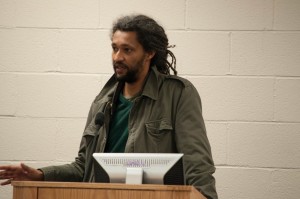By Albert Cavallaro
Correspondent

Director Alain Gomis came to campus for a screening of his film, “Tey” — the recipient of multiple awards, such as the 2013 FESPACO Gold Stallion Award — last Monday, Oct. 14.
The film screening was sponsored by African-American Studies, the International Studies Program, the Center for Global Engagement, the School of Humanities and Social Sciences, and the World Languages and Cultures department.
“Tey” (or “Today”) is presented as a type of modern-day fairytale, an exhibition of magical realism.
Set in Senegal, a man named Satché, who recently returned from America, knows that it is the last day of his life, his death foretold before the movie begins. Satché — a healthy man, a husband, a father, a son — is going to die at the end of the day and that is that.
The movie was simply about acceptance.
Throughout the day he visits family, friends and people from his past. It is a film that focuses on simple moments and the drama and power they can posses in and of themselves.
It is also a film that is noticeably lacking in dialogue. Instead of conversation, the movie focuses on images, sensations and the power imbued in them.
This silence artistry of the movie is prone to leave the viewer in a dream-like state and gives the movie a quieter, more intimate feel than perhaps a movie filled with big explosions and car chases could provide.
“I want to create suspense with simple moments to open the time as in a magical moment,” Gomis said in a director’s statement.
It was from his imagination that this movie was created.
This movie, however, could not have been so vividly brought to life without the main actor Saul Williams — an American singer, poet and actor, who portrayed the mostly silent Satché. Williams was described by Gomis in the Q&A following the film as having a kind of “aura — a special energy.”
The audience’s reaction to Williams’s aura and Gomis’s film was mixed. Two students’ differing reactions to the film capture the differing reactions quite well.
“The movie was something I have never experienced before. It was a true culture shock,” junior sociology major Patrick Dubuis said.
One other student pointed out how relatable and accessible the film was.
“The overwhelming amount of silence made the film more universal. With its absence of language and focusing on human expression and sensations, it became accessible to any culture, much in the way that fairy-tales and myths are universal as well,” junior psychology major Mariah-Lynn Black said.






